Cats are naturally happy, loving, and affectionate creatures. Cats value the presence of their pet owners a lot. You’ll often see them frolicking about in your presence, jumping from your bed to the couch and the mat, basically having the time of their lives.
But what happens if your once affectionate feline finally becomes withdrawn and aloof? What might cause a happy cat to begin behaving indifferently to its owner suddenly? Indeed, this is one of the most frequently asked questions among pet owners.
The main reason why your cat may be giving you the cold shoulder all of a sudden is that like most animals, cats have their own unique temperament and decide when they need social interaction from their pet parents. Remember that unlike us, cats are not social animals. Therefore, they do not crave attention the same way we do.
From the above explanation alone, it’s evident that there’s nothing to worry about when a cat suddenly begins to ignore its owner. But as you shall discover later on, there are many more reasons why your little furball might be withdrawing from you.
Table of Contents
Tell-tale Signs That Your Cat Is Trying to Avoid You
A cat may either ignore their owners or every other member of the household.
The following are some of the signs indicative of a cat that doesn’t have anything to do with you.
A. Hiding behind objects whenever you’re around,
B. Running away from you as you approach it,
C. Staying away from your favorite places, such as the kitchen, bedroom, and your favorite couch, or
D. Showing friendliness to, and a desire to be cuddled by, strangers while avoiding all attempts of petting from their owners.
Why Does My Cat Want To Be Alone All Of A Sudden?
One of the common questions that most vets get from concerned pet parents is, “my cat won’t come near me anymore, so what should I do?”
Indeed, you may have asked yourself the all-too-important question – why does my cat suddenly hate me?
Besides their intrinsic nature to seek attention from their owners only when they want to, the following are some more reasons why your little feline friend may be trying to avoid you.
1. They are Grumpy
Cats are like little children and when anything upsets them, they get really grumpy. Besides, they have a profound memory and will remember people, places, and events from years ago. That includes those who annoyed them in some way.
So, if you yelled at your furball only a week ago, you’d be mistaken to believe your cute little friend has forgotten it.
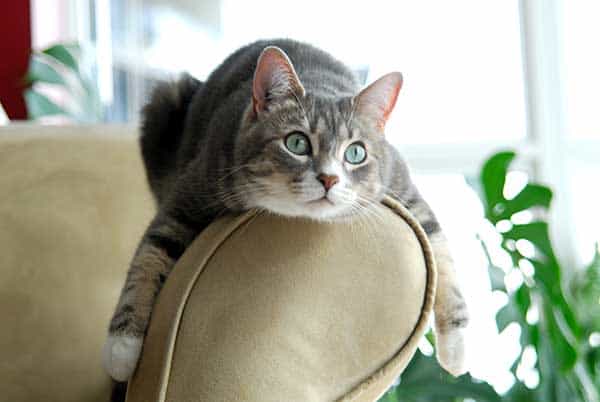
Remember that cats don’t take yelling and hitting lightly, even when the action is clearly well-intentioned. These adorable pets only love to be petted and spoiled with gifts regardless of how naughty they get.
And even if you accidentally offended them, they will still hold grudges for months on end unless you step up and express remorse for your actions.
So, to avoid getting snubbed by your feline friend, desist from punishing it in a manner that may only reinforce negative behavior.
Grumpiness may also result from a past traumatic event or general traumatic upbringing. That’s especially true for cats in rescue centers, which underscores the importance of establishing the social and medical history of a cat before bringing it home.
2. You Changed Routines
Like most animals, cats are creatures of habit. A slight change in their routine is all it takes to throw them off balance. Examples include moving homes, changing the cat’s diet, bringing a new pet home, and home makeovers.
Even a subtle change in body cologne, hand lotions, or laundry detergent is enough to trigger anxiety in cats.
Once you establish a routine, strive to adhere to it. Otherwise, you’ll only get your cat anxious and stressed.
3. They are Relaxing
Cats are playful pets that require plenty of playtimes to help them release their pent-up energies. But before playing with your cat, establish whether the cat is presently disposed to it.
Though most pets are active and playful, they like it better when we play with them on their terms.
Therefore, if you beckon your cat to come play with you but it seems uninterested, the chances are that your feline friend is relaxing and doesn’t want to be bothered.
What you should do is allow the cat ample time to relax and as soon as it gets in the mood for playing, it will naturally come to you, meowing for your attention.
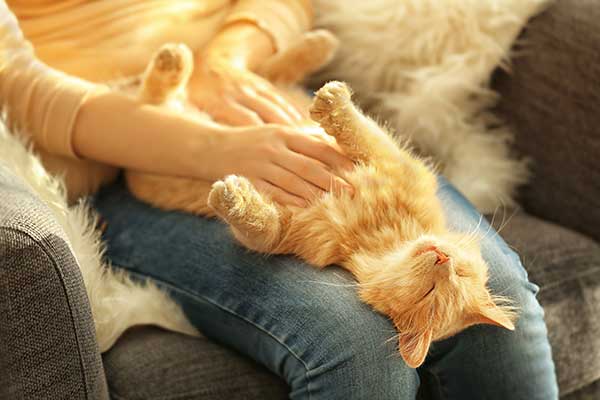
4. Deterioration of the Senses
Another common reason why your cat could be ignoring you is due to a sudden or gradual decline in its sense of hearing or sight.
With time, most cats experience partial blindness and when that happens, it may cause them to retreat from their active and playful lives.
A decline in a cat’s sense of hearing is another reason that may cause it to respond inappropriately to petting or cuddling.
According to experts, cats have developed specific vocalizations that they only use on their human owners; for example, the meow. Though kittens use meow to communicate with their parents, adult cats meow almost exclusively for their human parents.
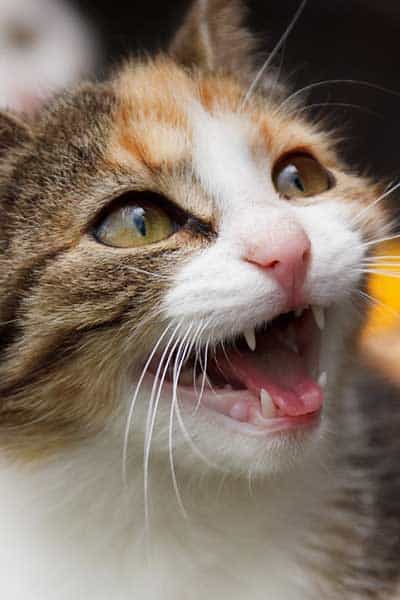
Cats boast an acute sense of hearing and can pick up some of the faintest sounds, such as a mouse moving in the attic. And like dogs, cats answer to their names.
Therefore, you should be worried if your little furball no longer responds whenever you call its name. That could be indicative of hearing impairment.
However, you should also be able to tell the difference between a hearing-impaired feline and one that’s ignoring you outright. In the latter case, the cat may respond to your calls by turning its head, moving its ear, or wagging its tail, even though it might not necessarily come to you.
5. A Distraction
Generally, cats demonstrate a heightened awareness of their surroundings. But at times, the cat may be too engrossed in their playtime or grooming sessions to notice anything else happening around them, including their owners.
It doesn’t mean the cat hasn’t taken notice of your presence or calls. Instead, the cat finds what it’s doing too important to attend to your needs.
A distraction could also be negative. For instance, if there’s a perceived threat, the cat may be hesitant to respond. You’ll notice that a cat chasing after a mouse, snake, or bird will hardly break the chase to answer your calls. Once the coast is clear, your little furball will come running to you.
6. Your Cat Is Aging
My cat doesn’t like me anymore, could this be an age-related issue? Yes, as time goes by, older cats become less curious about most of the things that they initially took an interest in.
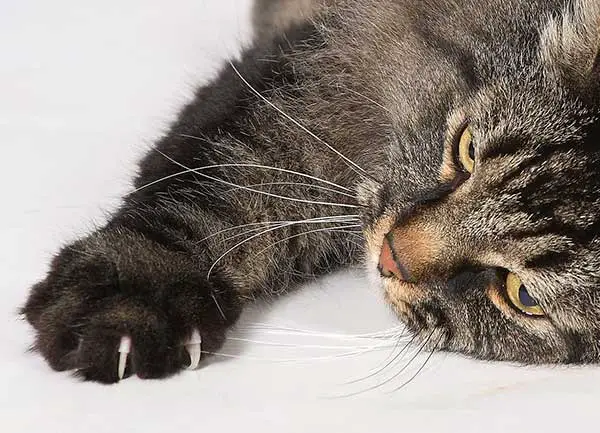
If you’ve had your cat for eight years, that’s nearly 3,000 days of shouting the same names and commands to your feline friend. It’s only natural that the cat now finds it monotonous to respond to those commands. Older cats tend to be more explorative of the things that they’ve never done before.
Besides, old age comes with chronic conditions, such as arthritis and muscle aches. These conditions result in pains and aches, which make your pet more sensitive to petting and cuddling.
7. Other Cats in the Neighborhood
Cats are highly territorial and depending on the breed, they may not take lightly the idea of other cats encroaching into their territories.
If a cat from your neighbor next door happened to have sprayed outside your cat’s patch, you can expect your feline friend to feel upset, especially when it cannot locate the intruder to square things off.
These seemingly little acts of incursions may make an otherwise playful cat to retreat. Check for signs of scratching on posts and other outdoor surfaces. If you suspect an intrusion, apply artificial cat pheromones on outdoor posts, trees, and other surfaces to help alleviate your cat’s anxiety.
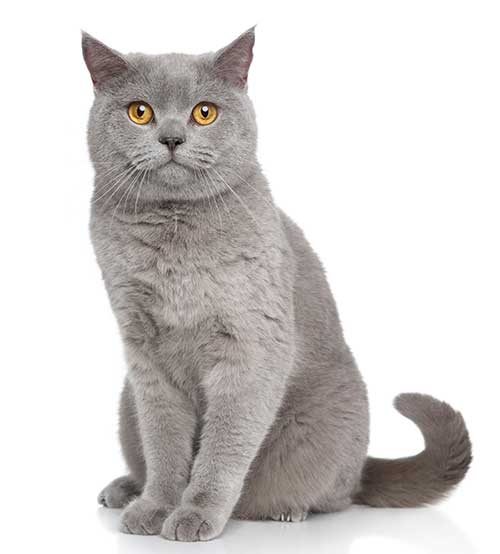
8. An Underlying Medical Problem
Any medical condition that causes pain and lethargy is likely to make your cat uninterested in you.
Generally, cats tend to isolate themselves whenever they’re ill. Besides, they have no way of communicating their problems and will leave it to you to figure it out on your own.
If there’s an underlying medical problem preventing your cat from freely associating with you, check for significant changes in the cat’s eating or drinking habits. Also, check if your feline friend is using its litter box normally. There might also be changes in its vocalizations.
Your best bet here would be to schedule an appointment with your vet.
What Can I Do to Regain My Cat’s Trust?
Once you’ve established that your feline friend is scared of you, you should embark on a raft of measures that will see you regain its confidence and trust.
Some of the remedies you could apply include;
-
- Give your cat enough space and allow it to come to you at will.
- Try to keep calm while you’re around your cat.
- Feed the cat its favorite foods.
- Offer the cat treats from your hands to foster a stronger bond between the two of you.
- Come near your cat and sit next to it. If it comes closer to you, pet it gently.
- Avoid forced grabbing and limit sudden movements.
- Take care of your kitto’s mental stimulation by giving it enough puzzle toys.
So, Why Is My Cat Suddenly Scared of Me?
Well, the reasons are abundant, ranging from normal behavioral characteristics to medical conditions. Understanding the root cause of the problem is the first step in finding a suitable remedy.




My male cat has 3 other siblings in which he has grown up with me my husband and my mom. He always plays and fights with his brother. He always loves on me but the last 2 weeks he has been avoiding me. He runs when i come near him. He jumps on the bed like he wants up there but he stops and looks like he’s in thought and decides to get on the floor. He loves on my mom but seems he doesn’t want anything to with me. The only thing different is that im home from work for a while because of this pandemic. But it’s not the first time i have been home for a span of time. He’s not sick and his routine is all normal except the way he’s treating me. Any insight or advice? I’ve been giving him space but it doesn’t seem to help any.